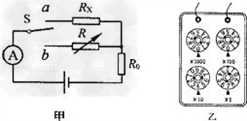某实验小组,利用DIS系统观察超重和失重现象,他们在电梯内做实验,在电梯的地板上放置一个压力传感器,在传感器上放一个质量为2kg的布娃娃(g=10m/s2),如图甲所示,实验中计算机显示出传感器所受物块的压力大小随时间变化的关系,如图乙所示.以下根据图象分析得出的结论中正确的是

A.从时该t1到t2,娃娃处于先超重后失重状态
B.从时刻t3到t4,娃娃处于先失重后超重状态
C.电梯可能开始停在低楼层,先加速向上,接着匀速向上,再减速向上,最后停在高楼层
D.电梯可能开始停在高楼层,先加速向下,接着匀速向下,再减速向下,最后停在低楼层
答案:C
题目分析:由图可知,从时该t1到t2,娃娃处于超重状态,选项A 错误;从时刻t3到t4,娃娃处于失重状态,选项B错误;超重时加速度向上,失重时加速度向下,所以从图像上看电梯可能开始停在低楼层,先加速向上,接着匀速向上,再减速向上,最后停在高楼层,选项C 正确,D 错误;

